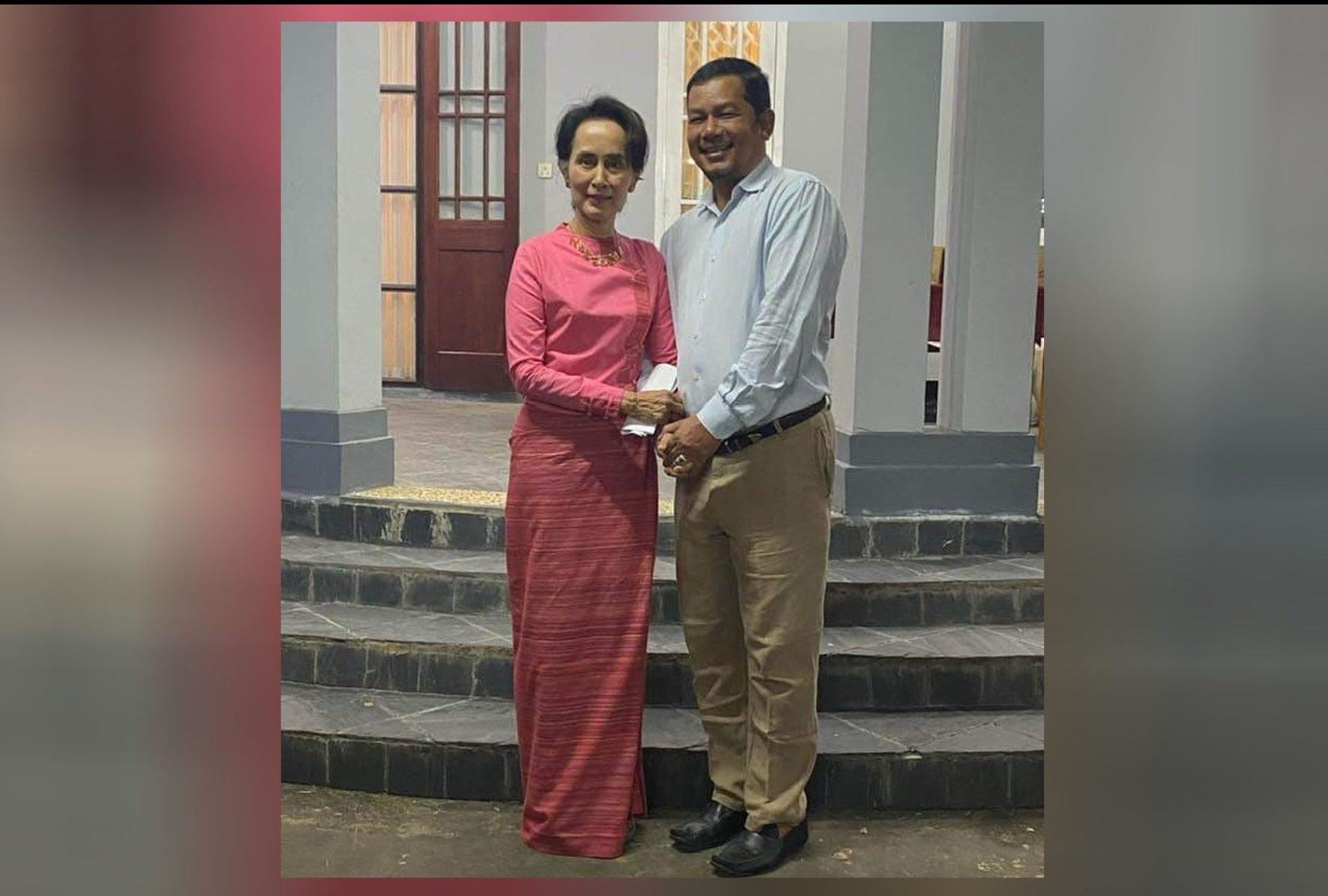Myanmar regime leader Min Aung Hlaing turned down two offers made by then civilian leader Daw Aung San Suu Kyi during last-minute negotiations aimed at preventing the military coup that overthrew her government on Feb. 1, 2021, according to one of Daw Aung San Suu Kyi’s close aides.
It has been widely reported that Min Aung Hlaing pushed the Daw Aung San Suu Kyi-led National League for Democracy (NLD) government, after it was elected to a second five-year term in office, to allow him to hold the office of president. However, the details of their discussions, and what each side offered during the closed-door meetings in Naypyitaw a few days before the takeover, had been largely unknown until U Kyaw Htay Oo, an American citizen who was released during the regime’s amnesty last month, revealed them to The Irrawaddy.
During the meetings in late January 2021, military chief Min Aung Hlaing repeatedly demanded the presidency. In exchange, the source said, the army boss told Daw Aung San Suu Kyi that he would approve the removal of a constitutional provision that bars her from the country’s top job. Under his plan, she would become the president of Myanmar for the first three years of the NLD’s second term; then he would take office for the remaining two years and beyond.
His offer was rejected by State Counselor Daw Aung San Suu Kyi, who instead asked him to accept either a vice presidency or a new post as chairman of the Military Commission, as his term as the military chief had expired.

“Indeed, he [Min Aung Hlaing] asked [Daw Aung San Suu Kyi] to agree to something unlawful in order to satisfy his desire to become president. And as he couldn’t become the president, he staged the coup,” said U Kyaw Htay Oo. Until the coup, the botanist was the manager of the La Yaung Taw Horticulture Training School in Naypyitaw, which was established by the Daw Khin Kyi Foundation to provide vocational training for young people. The foundation was created by Daw Aung San Suu Kyi in honor of her mother. The last time U Kyaw Htay Oo met Daw Aung San Suu Kyi was on the night of Jan. 31, 2021, a few hours before soldiers showed up at her residence to arrest her.
Min Aung Hlaing claimed he had to stage the coup due to “mass vote fraud” in the November 2020 general election and accused the NLD of vote rigging. However, local and international election observers insisted the polls were free and fair.
After the coup, a few reports emerged that the general staged the coup because Daw Aung San Suu Kyi refused him the presidency, which he sought after military-allied political parties were crushed by the NLD in the election. In January 2022, however, Min Aung Hlaing offered a conflicting version of events, saying the NLD had approached him about reforming the constitution.
Nearly two years after seizing power, Min Aung Hlaing is still struggling to control the country due to a widespread popular armed resistance against him. In response, he has resorted to air and artillery strikes to crush the resistance, killing more than 2,600 people, including civilians, so far.
U Kyaw Htay Oo is a former political activist and political prisoner who had previously been jailed twice for his political activism during the 1988 uprising. He returned to Myanmar from the United States under the Daw Aung San Suu Kyi-led government to take part in what was supposed to be the country’s transition to democracy.
Until he was again arrested on a terrorism charge in September last year for contacting U Kyaw Moe Tun—Myanmar’s ambassador to the UN who is backed by the parallel National Unity Government—by phone, he provided food parcels to Daw Aung San Suu Kyi, who was then under house arrest at an undisclosed location. He was detained for over a year, first in Naypyitaw, then at Mandalay’s Yamethin Prison and later at Yangon’s Insein Prison, until his release as part of the Nov. 17 amnesty. During his detention, he met other close aides of Daw Aung Suu Kyi who had knowledge about the pre-coup meetings.
The botanist said that following his arrest he was taken to a military interrogation center where he was interrogated and tortured for 18 days until the junta officials learned their victim was an American citizen. He also faced death threats from his captors, who told him, “We might be promoted if you die [during interrogation].”
Most of the detainees he met at the interrogation center and prisons were young activists. He also met with officials of the ousted NLD government, NLD party members and military personnel including captains and majors who were jailed over disagreements with high-ranking officials or on suspicion of having ties to the opposition movement.
They told him that a deep mistrust is growing among military officials and that most junta troops and their family members are no longer happy due to unfair treatment, or feel insecure under Min Aung Hlaing and his generals.
Citing the accounts of military personnel detained with him, U Kyaw Htay Oo said Min Aung Hlaing is viewed as arrogant, and doesn’t trust anyone.
“He even throws files at Soe Win if he is not pleased with him,” he said.
Soe Win is the second-most-influential military general after Min Aung Hlaing in the Myanmar regime.

















